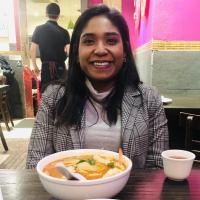Students
PhD Student Profiles
Anthropology
Aarushi Shah
Track: Anthropology
Cohort Year: 2021
Areas of Interest: Medical and Feminist Anthropology, Maternal and Reproductive Health and Rights, Trauma and Resilience, Sexual and Gender-Based Violence, Subaltern Studies (in South Asia), Gender and Health Equity
Education: BA, Anthropology, Harvard College (2021)
Aarushi Shah became passionate about the intersection of anthropology and public health as an undergraduate student at Harvard College, where she trained as a qualitative researcher on a project examining the lived experiences, help-seeking behaviors, and support needs of women survivors of intimate partner violence. As a fellow in the NIH Predoctoral Training Program in Gender, Sexuality, and Health (GSH) at Columbia University, Shah plans to continue exploring questions at the intersection of violence, maternal, and reproductive health, mental health, and health systems through ethnographic and mixed methods research. Shah's current research involves exploring how male perpetrators of intimate partner violence in Goa, India navigate and embody ideals of hegemonic masculinity and paternalism based in the larger political economies, histories, and socio-religious traditions of post-colonial India. Ultimately, Shah aspires to conduct public health research that amplifies the voices of marginalized populations and develop scalable, culturally sensitive interventions in collaboration with affected communities.
![]()
Betselot Wondimu
Track: Anthropology
Cohort Year: 2021
Areas of Interest: Structural Violence & Social Suffering, Embodiment, Cultural & Social Constructions of Mental Health, Race, Ethnicity & Immigration, Mixed Methods Research, Prevention Science, Harm Reduction, Health & Social Policy
Education: BS, Public Health Science, University of Maryland, College Park (2019); BS, Anthropology, University of Maryland, College Park (2019)
Betselot Wondimu is interested in examining the etiology of mental distress and foregone mental health care in black and immigrant populations. Wondimu hopes to explore conceptions of embodiment, resilience, and enculturation which are interrelated with race- and assimilative- based stress, and examine how they intersect with social marginalization. Through mixed methods research, Wondimu aims to improve communication around mental health and coping strategies in cross-cultural contexts; inform the decisions of policymakers and institutional stakeholders; and redistribute educational and clinical resources to populations that have been historically excluded from access. Prior to his doctoral studies, Wondimu worked as a Public Health Analyst at RTI International's Center for Behavioral Health Epidemiology, Implementation, and Evaluation.

Tasfia Rahman
Track: Anthropology
Cohort Year: 2020
Areas of Interest: Medical Anthropology, Mental Health, Gender, Immigration, Race & Ethnicity,Asian American Health, Bangladeshi Diaspora, Social & Health Inequalities, Culturally Competent Care, Ethnographic Methods, Community-Based Participatory Research
Education: MA in Social Sciences (Anthropology), University of Chicago; BA in Anthropology, Medieval Studies, and Classics (Latin), SUNY Binghamton
Tasfia Rahman’s research focuses on understanding why there are gendered trends toward suicide, suicide ideation, and depression among Bangladeshi immigrant women in New York City. She is particularly interested in how broader social trends such as immigration, migration, colonization, and globalization can elucidate these trends often coded as mental conditions. Through her Master’s thesis research, she learned more about help-seeking thoughts and behaviors among Bangladeshi-American second-generation women regarding mental health and identified barriers in accessing culturally competent care. Before beginning her doctoral studies, Rahman worked for a pan-Asian policy advocacy organization, Coalition for Asian American Children & Families (CACF), where she collaborated with NYC-based Asian-led and serving community-based organizations, community members, local government, and researchers to address systemic inequities in health, education, and language access.
As an incoming fellow in the NIH Predoctoral Training Program in Gender, Sexuality, and Health (GSH) at Columbia University, Rahman further seeks to study the challenges Bangladeshi immigrant women face in the American healthcare system and develop more effective culturally competent care models through the use of ethnographic and community-based participatory research methods.

History
Laura Tracy Foote ("Tracy")
Track: History
Cohort Year: 2015
Areas of interest: History of public health and medicine, History of genetics and genomics, History of data science, Health inequality, Health policy and politics, Public health ethics, Middle East and North Africa
Education: MPH, Epidemiology, Global Health, Mailman School of Public Health, Columbia University (2015); BA, History, Williams College (2007)
Tracy Foote’s interest in the social history of medicine and public health began while she was an undergraduate history student at Williams College writing a senior thesis on “The Decline of Health and Health Services in Iraq from 1968-2003”, for which she was awarded highest honors. After college, Ms. Foote attended medical school at Northwestern University before ultimately leaving to pursue a career in public health. Ms. Foote received a MPH in Epidemiology with a certificate in Global Health. As part of her degree, she spent a semester+ working in Amman, Jordan at the Royal Health Awareness Society helping to design research on non-communicable diseases and grant writing. Ms. Foote then decided to re-focus on her interests in the history of medicine and public health with a PhD in Sociomedical Sciences, History Track. Her research interests focus generally upon health inequality at a system level and more specifically, on the intersection of the history of genetics/genomics and of Big Data and Open Access Science. Ms. Foote’s dissertation research focuses on the All Of Us Research Project, a NIH prospective cohort study recruiting one million people to share genomic, lifestyle, and environmental data to build a diverse health database.

Sociology
Alicia Jen
Track: Sociology
Cohort Year: 2022
Areas of interest: Asian American and Immigrant Health • Socialization • Structural and Interpersonal Racism • Adolescent and Young Adult Health • Sexual and Reproductive Health • Intimate Partner Volence Prevention
Education: MPH, University of Pennsylvania (2021); BA, Health & Societies, University of Pennsylvania (2019)
Alicia Jen (She/her) is interested in studying how family upbringing, acculturation, and racialization influence the formation of health beliefs and behavior, particularly among second-generation children of immigrants and Asian Americans. Jen is a GSH (Gender, Sexuality, and Health) Fellow and plans to focus her PhD research on intimate relationships and related health risks. Prior to joining the program, Jen worked as a research coordinator in a family planning clinic, conducting studies on topics such as contraception, STI prevention, and pregnancy care. Jen also has experience working on education and program evaluation in the realm of intimate partner violence prevention, including an MPH thesis that assessed attitudes towards online campus IPV resources during the COVID-19 pandemic through student focus groups. As an undergraduate, Jen participated extensively in Asian American student advocacy groups and hopes to continue that involvement in the New York City community.

Milan Riddick
Track: Sociology
Cohort Year: 2022
Areas of interest: Health Behavior • Racism and Health • Intersectionality • Health Equity • Social Determinants of Health • Medical Sociology • community-based Participatory Research
Education: BS, Biomedical Engineering, GeorgiaInstitute of Technology (2021)
Milan Riddick became interested in public health and health behavior research while studying as an undergraduate at Georgeia Tech. During that time she conducted independent, qualitative research to identify sources of trust and mistrust in the COVID-19 vaccine among Black citizens of Georgia. This work, in combination with Milan's efforts as a student advocate for racial and ethnic minority students, reaffirmed her dedication to addressing what she believes to be one of the greatest public health challenges our country faces: racism. At Columbia, Milan plans to examine intersectionality and investigate how experiences of racism in combination with other forms of interpersonal discrimmination impact medical mistrust and health behavior in Black communities. As a doctoral student, Milan's research will be supported by the NIH T-32 training grant in Gender, Sexuality, and Health.
Priort to attending Columbia, Milan worked in conjunction with the Fulton Country Board of Health to provide COVID-19 relief to its residents. Milan's educational background also has roots in bioengineering, drug design and delivery, and medical sociology. Milan's interdisciplinary background aids in her approach to addressing critical public health issues that impact her own community.

Alexander Borsa
Track: Sociology
Cohort Year: 2019
Areas of interest: Sexual Health, HIV, PrEP, Financialization, Stigma, Feminist Science Studies, Medical Sociology
Education: BA, Molecular Biophysics & Biochemistry and Women's, Gender, & Sexuality Studies, Yale University (2016)
Alexander Borsa studies sexual and reproductive health, with a focus on how processes such as financialization and geneticization shape identity and outcomes. His most recent publications trace the rapid influx of private equity investment in fertility and women's health services throughout the United States. Borsa is currently a member of the Harvard GenderSci Lab and the HIV Planning Group at the NYC Department of Health and Mental Hygiene. His research has been supported by the NIH T-32 training grant in Gender, Sexuality, and Health, as well as a Graduate Research Fellowship from the National Science Foundation.
![]()
Gloria Fortuna
Areas of interest: Medical and Feminist Sociology, Maternal and Reproductive Health and Rights, Sexual and Gender-Based Violence, Gender and Health Equity, Sexuality Studies, Ethnographic Methods, Community-Based Participatory Research
Education:
MPH, Columbia Mailman School of Health (2023)
BA, English and Gender Studies, Davidson College (2019)Gloria Fortuna studies sexual and reproductive health, with a specific focus on the influence of sexual socialization on identity and health behaviors. She is interested in under-theorized topics such as bisexuality and female sexual dysfunction; she hopes to contribute to research to better understand these multidimensional constructs, specifically their relationship to sexual violence and poor sexual and reproductive health outcomes. Prior to her doctoral studies, Gloria worked in Health Education before receiving her Master of Public Health degree from Mailman, with a concentration in sexuality, sexual and reproductive health. After having worked in sexual violence prevention and response, Gloria sought out more upstream approaches to violence prevention, leading her to design a comprehensive sexuality education curriculum as her Master’s thesis. Gloria plans to continue exploring the processes through which individuals become sexual beings capable of certain kinds of experiences, desires, and relationships. Using ethnographic methods, she aims to investigate the influence of acculturation, religion, and racial identity on sexual and reproductive health among Italian Americans.

DrPH Student Profiles
Anubhuti (Anu) Poudyal
Areas of Interest: Global Mental Health, HIV and Mental Health, Digital Health, Social Network Analysis, Gender and Mental Health
Education: Master of Public Health, Health Promotion and Community Health Sciences, Texas A&M School of Public Health (2018)
Cohort: 2021
Anubhuti (Anu) Poudyal is a doctoral (DrPH) student in the Sociomedical Sciences Department. She is a trainee in T32 Fellowship on Social Determinants of HIV. Her background is in global mental health, with a focus on the delivery of evidence- based, technology-driven interventions in low- and middle-income countries. She is primarily interested in understanding social and cultural factors influencing comorbidites such as HIV and mental health. As a T32 fellow, she intends to explore social determinants of HIV that influence treatment outcomes and medication adherence among vulnerable populations with comorbidities. During her doctoral program, Poudyal also wants to learn social network analysis to understand social structures and support systems that can positively influence health outcomes in low-resource settings. Before joining Columbia, she worked at the Division of Global Mental Health, George Washington University as a Senior Research Associate.









